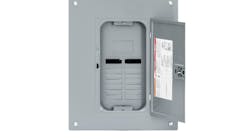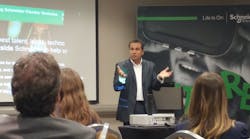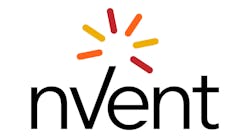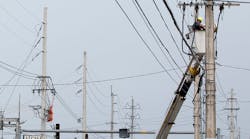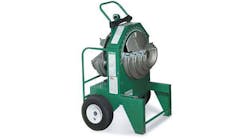In an industry where the local touch still reigns supreme, North America's electrical leagues and associations provide valuable opportunities for networking and training.
Building membership and improving programs are not new concerns for the association executives of the industry's local electrical leagues and associations. But these goals loom larger than ever because of some key industry trends. Utility deregulation, mergers and acquisitions and the robust electrical construction market now make it tougher than ever for electrical leagues and associations to recruit new members and offer programs that will be of interest to companies from all segments of the electrical market.
Historically, these groups focused on providing networking opportunities for electrical distributors, independent reps, electrical manufacturers, electrical contractors and other end users and electric utilities on a local basis. In addition to networking, many of these groups now often offer discount programs on business services such as health and life insurance, liability insurance, and courier discounts.
Training is another key service these groups provide, and leagues are expanding their offerings from a base of technical courses in products and electrical design to more general business courses such as basic computer skills, desktop publishing, accounting for non-financial managers and stress management. One league, Minnesota's North Central Electrical League (NCEL), even has a Toastmasters chapter so members can hone their public speaking skills.
Association executives agree that it's tough to develop a package of courses applicable to the information needs of distributors, reps, manufacturers and end users, yet does not duplicate what a member's "core" industry trade group may offer, or is otherwise available at local colleges or business schools. These core trade associations include the National Association of Electrical Distributors (NAED), St. Louis, Mo.; National Electrical Manufacturers Association (NEMA), Rosslyn, Va.; National Electrical Manufacturers Representatives Association (NEMRA), Tarrytown, N.Y.; and National Electrical Contractors Association (NECA), Bethesda, Md.
"National associations have more staff and funds to develop programs," says one association executive. "We try to complement each other rather than compete with each other."
Along with networking, training and business-program discounts, local leagues and associations offer a voice for the concerns of a region's electrical businesses to other local or regional business or government entities, says Don Glays, executive director, The Electric Association, Oak Brook, Ill., and director of the International League of Electrical Associations (ILEA).
"Having a large membership base, especially one that includes national and regional companies, gives a local association credibility when dealing with government, utilities and the public," he says. "When government, utilities and the public recognize that the local association represents a broad base made up of all sizes of membership, they are more apt to listen. I know from personal experience that we get a better hearing and a better reaction to issues when we can state that our membership includes leading, well-respected companies. The benefit to companies is that when the association works successfully on issues, the entire industry wins."
Yet when any association member starts searching for justification for business expenditures at budget time, league membership dues often come under close scrutiny, and association executives must be ready to answer the question, "What have you done for me lately?" That's why the current emphasis on solid programming at league events is key, say several association executives.
Time is also an issue, and when business is good, some members or prospective members may not believe they have time to devote to league activities. For instance, Kansas City's solid electrical construction market has actually had an adverse affect on member participation in the Missouri-Kansas Electrical Association, because companies are so busy, they don't have as much time to spend at league activities. The business surge also means some members aren't prospecting as hard for new business contacts at association events because they have all the business they can handle, says Olivia Golden, the association's executive director. "They have plenty of business, maybe more than they know what to do with. That makes our job a little harder," she says.
In St. Louis, utility deregulation and mergers and acquisitions have had a negative impact on membership and have Gloria Baysinger, executive vice president, St. Louis Electrical Board, searching for programs to entice new members. As utilities reevaluate their businesses, she says, some will question their involvement in local electrical leagues. It's a scenario that happened in her market when Union Electric, a St. Louis-based electric utility and historically one of the Electrical Board's strongest supporters, cut back on its league membership.
"Utilities are rethinking their support of the leagues, but we are good for them and they are good for us," she says.
Union Electric's move prompted Baysinger to redouble her efforts to get new members. She recruited Bob Finley, former president of Glasco Electric Co., St. Louis, and a well-respected figure in the area's electrical business, to help her find new members. It's an effort that is already bearing fruit, she says.
Mergers and acquisitions have affected the St. Louis Electrical Board's membership, too, but many other local electrical associations have the same problem, she says. "Membership is always a problem with the merging of companies. That's becoming more of a concern. The more they merge, the fewer members we have. We always have to be on the lookout for non-dues revenue."
She says many leagues are trying to maximize income from their trade shows and from discount programs on insurance, long-distance or cellular telephone service and other business services.
Local trade shows held every two or three years can be a big revenue producer. Last year's Houston Electrical Leagues show, the Southwest Electrical Exhibition, had over 400 exhibitors, and is generally regarded as one of the biggest local or regional shows in the U.S. The Upper Midwest Electrical Expo, sponsored by the North Central Electrical League, the biennial trade show by the Philadelphia Electrical Association and shows sponsored by leagues in Chicago, St. Louis and Kansas City are also sizeable shows.
Key to the success of association-sponsored trade shows is having distributor support, says Don Glays of Chicago's Electrical Association and the ILEA.
"That support comes in two main areas: promoting the show to vendors for booth sales and encouraging customers to attend," he says. " Shows managed by associations with a large distributor base enjoy higher attendance when the distributors adopt the show as a good way to promote their products to customers. Trade shows are intended to be a source of non-dues revenue for the association, but they also serve an equally important function-educating and informing the industry."
Several association executives believe many of the solutions that will help them overcome these challenges in the future will come from talking with representatives from different electrical associations around North America. They find the annual ILEA meeting to be a great place to see what programs are working in different areas of North America.
Says the St. Louis Electrical Board's Gloria Baysinger, "You sit in your own office and you think, 'I am the only one who has this problem.' And then we have the conference once a year and I find out that everyone has the same problem."
Arizona Electric League of Arizona
727 East Bethany Home Rd., Suite D122 Phoenix, Az. 85014-2151Phone: 602-263-9391 Fax: 602-277-9881
Larry Yehle, executive director
California Electric & Gas Industries Association
16445 Alverado St. San Leandro, Calif. 94577 Phone: 510-357-6231 Fax: 510-357-5703 Duane Tuttle, executive director
Colorado Rocky Mountain Electrical League
2170 South Parker Rd., Suite 285 Denver, Colo. 80231-0704 Phone: 303-695-0089 Fax: 303-695-0704
Ed Blum, executive director
Georgia Southeastern Electrification Council, Inc.
4225 University Ave. Columbus, Ga. 31907-5645 Phone: 706-569-3186 Fax: 706-565-3564
H. Cecil Biggs, president/CEO
Greater Atlanta Electric League
2750 Roxborough Dr. Roswell, Ga. 30076-2451 Phone: 770-740-9616 Fax: 770-664-1658 Robert Brown, executive vice president
The Electric Association
1919 Swift Dr., Suite 121 Oak Brook, Ill. 60521-1502
Phone: 630-575-8045 Fax: 630-575-8049
www.eachicago.org
Indiana Electric League of Indiana, Inc.
6801 Lake Plaza Drive, Suite A-110 Indianapolis, Ind. 46220
Phone: 317-842-3024 Fax: 317-842-3025 E-mail: [email protected]
Web site: www.indiana-eli.org
Nancy Rainey, executive director
Louisiana Electrical Association of New Orleans 4501 Camp St. New Orleans, La. 70115 Phone: 504-899-4352 Clarence Miller, executive director
Electric League of Maryland
815C Central Ave. Linthicum, Md. 21090-3114
Phone: 410-636-3666 Fax: 410-636-6685 John Benzing, executive director
Massachusetts Electric Institute
40 Salem St. Lynnfield, Mass. 01940-2665 Phone: 617-246-2300 Fax: 617-246-5531
Timothy Marsac, managing director
Minnesota North Central Electric League
2901 Metro Drive, Suite 203 Bloomington, Minn. 55425-1556
Phone: 612-854-4405 Fax: 612-854-7076
Web site: www.ncel.org
Dale Yohnke, executive director
Electrical Board of Missouri and Illinois
8514 Eager Rd., Suite E St. Louis, Mo. 63144-1483
Phone: 314-968-1000 Fax: 314-968-1050
www.electricalboard.org
Electric League of Missouri & Kansas
P.O. Box 414168 Kansas City, Mo. 64141-4168
Phone: 816-561-5323 Fax: 816-561-1249
E-mail: [email protected]
Web site: www.electricleague.org
Olivia Golden, executive director
Nebraska-Iowa Electrical Council
8801 W. Center Rd., Suite 207 Omaha, Neb. 68124-2057
Phone: 402-392-2832 Fax: 402-392-1543
E-mail: [email protected] Robert Morris, executive director
Metropolitan Electric League
2810 Morris Ave. Union, N.J. 07083
Phone: 908-964-1122 Fax: 908-964-4379
William Bodnaruk, executive director
Electric Association of Rochester
P.O. Box 20219 Rochester, N.Y. 14602-0219
Phone: 716-334-4730 Fax: 716-334-1919
Charles Eckert, executive vice president
Ohio Electric League of Eastern Ohio
126 City Centre One Youngstown, Ohio 44503
Phone: 330-744-5238 Fax: 330-744-3922
Electric League of Northern Ohio
5005 Rockside Rd. Independence, Ohio 44131
Phone: 216-221-8370 Fax: 216-226-5961
Terry Hanna, manager
Greater Cincinnati Electrical Association
P.O. Box 37096 Cincinnati, Ohio 45237
Phone: 513-731-4232 Fax: 513-731-8832
Louis Zimmerman, executive director
Western Electric Power Institute
827 Northeast Oregon St. Portland, Ore. 97232-2108
Phone: 503-231-1994 Fax: 503-231-2595
E-mail: [email protected]
Web site: www.powerin.org
Clifton Anderson, executive director
Electric League of Western Pennsylvania
919 Maryland Ave. Pittsburgh, Pa. 15232
Phone: 412-363-8011 Fax: 412-661-5403
Carole King, executive director
The Electrical Association of Philadelphia
Bala Cynwyd, Pa. 19004-1735 Phone: 610-668-1700, ext. 11 Fax: 610-668-1703
E-mail: [email protected]
Web site: www.eap.org
Dwight Price, executive director
Pennsylvania Electric Association
301 APC Building 800 N. 3rd St. Harrisburg, Pa. 17102
Phone: 717-257-5853 Fax: 717-257-5858
Electrical League of Rhode Island
38 Eagle Ave. Warwick, R.I. 02889
Phone: 401-737-4171 Fax: 401-737-4171
Mike Hickey, executive secretary
Electric League of Chattanooga
P.O. Box 182255 Chattanooga, Tenn. 37422-7255
Phone: 423-757-1241 Fax: 423-757-1234
Don Mills, executive director
Houston Electrical League
P.O. Box 61857 Houston, Texas 77208-9892
Phone: 713-207-7518 Fax: 713-207-9892
E-mail: [email protected]
Web site: www.hel.org
Gail Vyoral, coordinator
Intermountain Electrical Association
512 Lawndale Dr. Salt Lake City, Utah 84115-4776
Phone: 801-484-7900 Fax: 801-486-6916
Klaas DeBoer, Jr., managing director
Inland Northwest Electrical League
2211 East Riverside South, Suite B Spokane, Wash. 99202-4776
Phone: 425-646-4727 Fax: 425-646-4729
David Jackson, executive director
Electric League of the Pacific Northwest
123 105th Ave. SE, Suite 101 Bellevue, Wash. 98004-6265
Phone: 425-646-4727 Fax: 425-646-4729
E-mail: [email protected]
Julie Brown, executive manager
Northwest Public Power Association
P.O. Box 4576 Vancouver, Wash. 98662-0576
Phone: 360-254-0109 Fax: 360-254-5731
E-mail: [email protected]
Norman Jacox, general manager
Alberta Electrical League
P.O. Box 40444 Highfield Calgary, Alberta, Canada T2G 5G7
Phone: 403-268-4085 Fax: 403-262-5928
E-mail: [email protected]
British Columbia Electrical Association
224-3989 Henning Dr. Burnaby, British Columbia, Canada V5C-6N5
Phone: 604-291-7708 Fax: 604-291-7795 E-mail: [email protected]
Tracey Gallant, executive director
Manitoba Electrical League
14-395 Berry St. Winnipeg, Manitoba, Canada R3I-1N6
Phone: 204-885-3668 Fax: 204-885-3678
Larry McLennan, executive director
Nova Scotia Electrical League
2735 Agricola St. Halifax, Nova Scotia, Canada B3K-4E2
Phone: 902-455-6544 Fax: 902-453-1617
Kathleen Saunders, executive director
Ontario Electrical League
2 Lansing Square, Suite 1000 North York, Ontario, Canada M2J-4PB
Phone: 416-495-0052 Fax: 165-495-1804
David Reid, president
Ideas You Can Borrow, Steal or Copy: If your local electrical league is on a crusade to increase membership or improve programs, get in touch with members of other leagues to see what's working for them. A list of North American electrical leagues and associations begins on page 38. Below are some ideas leagues are using and that you may want to consider for your own group.
Basic member benefits: * Experiment with new networking opportunities in addition to the standard venues such as monthly luncheons or breakfasts, trade shows, golf outings and holiday luncheons. * Look for other corporate discounts you can offer members in addition to what's generally available with car rentals, credit union memberships, long-distance telephone service, cellular telephone service and business or liability insurance. * Make sure all new members are enrolled in your local Better Business Bureau. * Provide updates on state and federal legislation that will impact your members most directly.
Training: * Offer courses on the fundamentals of electricity and product basics. * Sponsor workshops in basic business skills such as salesmanship, negotiating, time management and personnel management. * Consider sponsoring workshops on CPR and first aid, stress management and other areas of personal development. * Run classes on basic computer skills such as working with Office 98, desktop publishing and Web-site design. * Set up a video library with videotapes on general business skills, and get some members to donate videotapes on selected areas of study. * If your association office has a meeting facility, offer it to members as a training/meeting room that they can use with their customers. * Set up a chapter of Toastmaster's International within your association to help members develop their public speaking skills.
Employee development and recruiting: * Offer your association and its members as a resource to area colleges, universities and technical schools that offer electrical design classes or related fields of study. * Motivate your members to offer summer internships to students from these schools and universities. * Include job postings on your association's Web site.
Online communications: * Use a Web site for online surveys, membership registration and RSVPs for association/league events. * Develop an online buyers' guide. * Publish an online directory of the lines that area reps carry. * Include hot links to related regional and national organizations on your Web site.
General: * Make sure your association executives are active with the International League of Electrical Associations (ILEA) so they can bring back new ideas to your association from what's working in other. Contact Don Glays, Chicago Electrical Association, Chicago, Ill., at 630-724-0200 for more details on the ILEA. * Surf the Net to see what ideas you can borrow at other electrical associations. Start with these Web sites: www.eachicago.org; www.indiana-eli.org; www.electricleague.org; www.eap.org; and www.hel.org.

